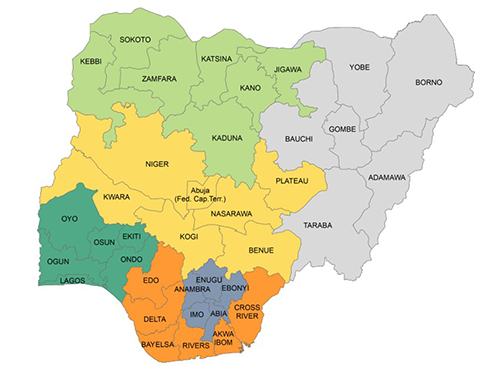Figure 8. Geopolitical zones in Nigeria.

| North-Central (seven states): Niger, Kogi, Benue, Plateau, Nasarawa (Nassarawa), Kwara and Federal Capital Territory of Abuja. | ||
| North-East (six states): Bauchi, Borno, Taraba, Adamawa, Gombe and Yobe. | ||
| North-West (seven states): Zamfara, Sokoto, Kaduna, Kebbi, Katsina, Kano and Jigawa. | ||
| South-East (five states): Enugu, Imo, Ebonyi, Abia and Anambra. | ||
| South-South (six states): Bayelsa, Akwa Ibom, Edo, Rivers, Cross River and Delta. | ||
| South-West (six states): Oyo, Ekiti, Osun, Ondo, Lagos and Ogun. |
| • |
Niger Delta (9 states): Abia, Akwa-Ibom, Bayelsa, Cross River, Delta, Edo, Imo, Ondo and Rivers [Security situation 2021, 1.4.1.1.].
|
|
|
|
| • |
Middle Belt: the geographical belt of the South of Northern Nigeria and the North of Southern Nigeria. Besides the six states of the North-Central and FCT, Adamawa, Taraba and the southern parts of Kaduna and Bauchi are also considered as part of the Middle Belt. The definition of the Middle Belt can vary depending on the source. [Security situation 2018, 3.2.1].
|
Nigeria is the most populated country in Africa, with an estimated population of almost 210 million as of March 2021. It is a highly diverse country with regard to ethnic groups and languages. There are more than 250 ethnic groups, of which the main groups are: Hausa, Fulani, Yoruba, Igbo (Ibo), Ijaw, Kanuri, Ibibio, Tiv, Edo/Bini. The main spoken languages, of the 519 living languages in the country, include English, pidgin English, Hausa, Yoruba, Igbo, Fulani, Ijaw. English or pidgin English and Hausa are used for inter-ethnic communication.
In the north, the main ethnic groups are Hausa and Fulani, and several other groups such as Kanuri in the North East. The Middle Belt has many smaller, differing but related groups. Nigeria’s south is divided into a Yoruba-speaking area in the west and an Igbo-speaking area in the east. The main group in the Niger Delta are the Ijaw, although there are several other smaller ethnic groups. It should also be noted that parts of Nigeria are multi-ethnic, especially the urban areas.
The religious adherence of the population is nearly equally divided between Christians and (predominantly Sunni) Muslims, while a minority is composed of practitioners of indigenous religions or persons with no religious affiliation. Islam is the dominant religion in the north, while Christianity is dominant in the south of Nigeria. Religious syncretism, the mix of religious practices from different traditions, is also common.

